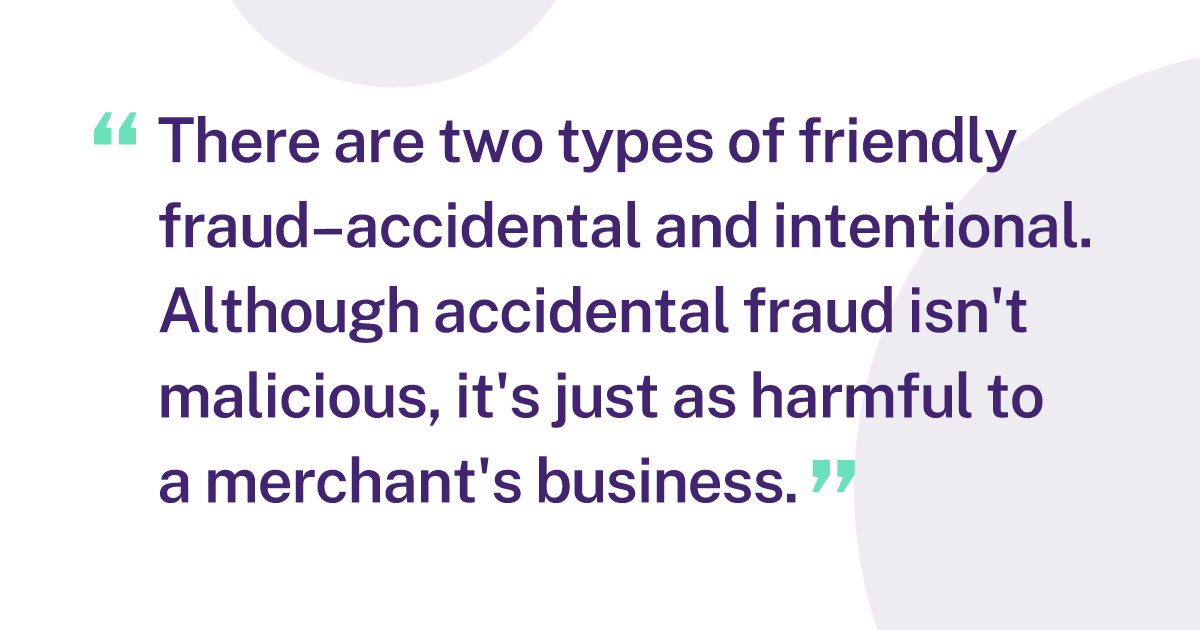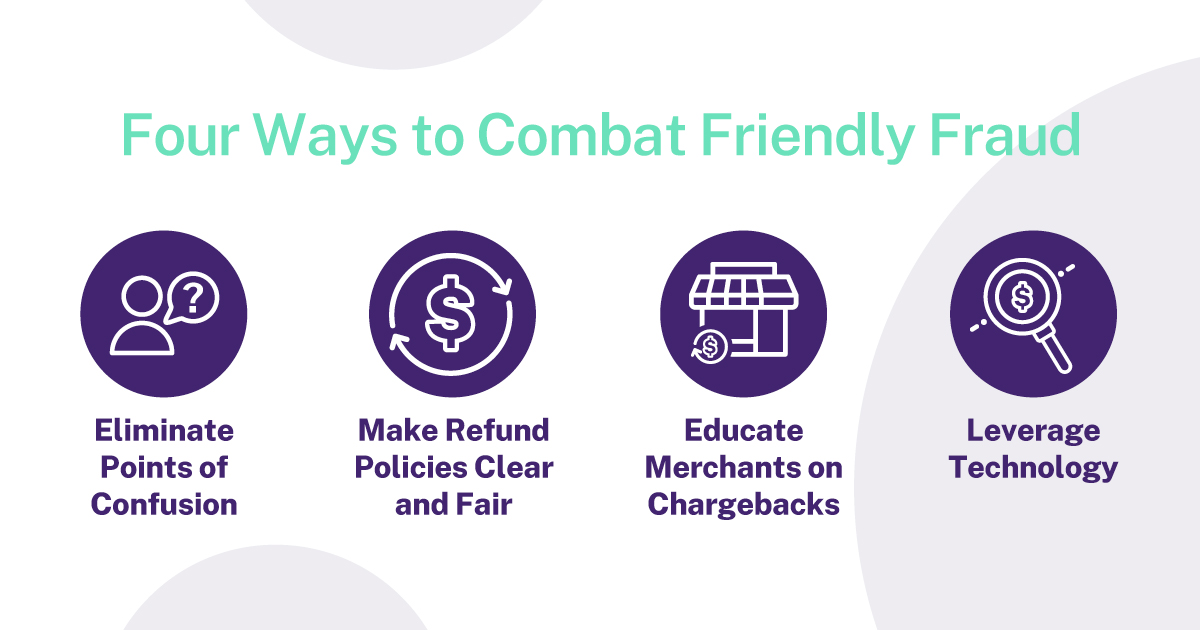Friendly fraud – also known as chargeback fraud or first-party fraud – occurs when a buyer attempts to receive goods or services without paying for them, in most cases through abuse of the chargeback process. It’s a problem on the rise – with total instances of friendly fraud up as much as 30% in 2022.
Chargeback fraud is a growing problem in payments for several reasons. First and foremost, it’s costly. When a bank detects fraud, the financial liability falls on the merchant, who must cover any losses and associated fees. Inventory loss can also be detrimental – especially for merchants with small businesses.
Experts expect chargebacks to cost merchants over $100 billion in 2023.
Merchants that run into too many chargebacks can also run afoul of their acquirers and card networks, leading to higher transaction fees or even enrollment in expensive monitoring programs.
Snowballing fraud cases don’t just put merchants at risk, either; they can potentially harm the merchant’s independent sales organization (ISO), independent software vendor (ISV) or payment facilitator (PayFac) partners.
Not only does rampant fraud increase the risk of costly non-compliance charges, but too many chargebacks can also degrade payment company relationships with acquiring partners. In extreme cases, this reputational damage could lead to increased wholesale rates or outright termination of the business relationship.
Why Friendly Fraud Is So Insidious
In addition to being costly, friendly fraud chargebacks can be tough to detect. The problem with friendly fraud is that it takes advantage of the legitimate chargeback mechanisms card networks and banks provide to protect consumers. Fraudsters blend in and rely on the apathy or lack of ability of merchants and their partners to determine which disputes are fraud and which aren’t.
In other words, friendly fraud hides in plain sight among the legitimate disputes filed daily.
Early identification and prevention are especially important in ecommerce, where every $1 of fraud costs $3.75 in total losses. Businesses must identify fraud early before bad actors can take advantage of the chargeback process. Unfortunately, without the right tools, this can be difficult to accomplish.
Fighting a chargeback is a time-consuming and complex process. Far too many merchants either don’t want to or don’t know how to handle it. As a result, they accept illegitimate chargebacks as an unfortunate part of doing business. Fraudsters depend on that lack of scrutiny on a case-by-case basis to pull off their thefts.
How Does Friendly Fraud Happen?
Not all friendly fraud is intentional. A significant number of illegitimate chargebacks happen by accident. Although the fraud in these cases is real and damaging, it’s not malicious.
There are three primary types of accidental friendly fraud:
- Misidentification of known transactions
- Unknown authorized transactions
- Unauthorized purchases within the household
In the first case, a cardholder checks their monthly statement and doesn’t recognize a charge for a purchase they know they made. This happens most often when a merchant’s descriptor on a statement doesn’t match their customer-facing branding. For instance, if a cardholder makes a purchase at a shoe store and then sees a $150 charge on their statement from a numbered company or differently-named legal entity, they may assume the charge was unauthorized and dispute it.

The second type of accidental fraud occurs when a cardholder doesn’t recognize an authorized purchase made by someone else they knowingly share a card with. This often happens when spouses or partners share cards. In these cases, the primary cardholder may report unrecognized purchases made by the secondary cardholder as fraud, even though it was legitimate.
The final type of accidental friendly fraud is unauthorized purchases made within a household. This is a huge problem in the gaming industry, where players can purchase in-app or in-game items like skins or upgrades using stored credit card data without the cardholder’s knowledge.
An example would be a young child using a family iPad to rack up tens of thousands of dollars worth of in-game charges without their parent realizing it. While these charges are technically unauthorized, they are still the cardholder’s responsibility.
Intentional fraud is more straightforward; it occurs when fraudsters submit chargebacks knowing they’re breaking the law. Unfortunately, even in clearly intentional cases, it’s easy for fraud to slip through the cracks. For example, deliberate fraudsters use tactics like delaying chargeback submissions to increase the perception of legitimacy.
Unfortunately, the sheer amount of noise in the chargeback space is often more than enough to allow intentional fraud to stay under the radar – even when fraudsters make apparent mistakes. To avoid unexpected losses, businesses must know how to recognize friendly fraud and have a plan to combat it.
Four Ways to Combat Friendly Fraud
Occasional legitimate chargebacks are an unavoidable part of doing business. However, there are ways merchants and their payments partners can effectively combat friendly fraud.
Some of the most effective strategies include:
- Eliminating the confusion that leads to accidental fraud
- Providing fair and transparent refund policies to customers
- Educating merchants
- Leveraging modern anti-fraud technologies

1) Eliminate Potential Points of Confusion
The first way payments providers can help stop friendly fraud is by ensuring merchant descriptors and transaction details match the merchants’ customer-facing branding and category.
Ideally, a merchant’s on-statement descriptor should clearly match its “doing business as” name. DBA names are important because many companies operate under one name but are legally registered under another. Ensuring a clear match between the information on a customer’s credit card statement and a merchant’s DBA is a great way to reduce accidental chargeback fraud.
2) Make Refund Policies Clear and Fair
Sometimes customers file chargebacks because they don’t understand or agree with a merchant’s refund policy. If a customer honestly believes they’re due a refund and can’t get one, that frustration can boil over. With chargebacks costing merchants an average of $3.75 for every $1 spent, this can become more costly than providing a refund.
To avoid unnecessary chargebacks, merchants must have fair return and refund policies that are easy to understand. They must also clearly communicate policies to customers at the time of purchase and on receipt to ensure buyers have more than one opportunity to read them.
Finally, while the customer is not always right, businesses should avoid denying refunds as a general policy. Instead, merchants should use discretion to determine when to bend the rules and when to hold their ground.
3) Educate Merchants on Chargebacks
Another way payment partners can reduce chargeback losses is with merchant education. Many merchants don’t understand chargebacks, their consequences or the options available to fight them. The more information ISOs, ISVs and PayFacs share with merchants, the better off everyone will be – including end customers.
To begin, spend time educating your merchants on the importance of minimizing chargebacks. Education may involve one-on-one training sessions, informational videos or in-depth guides. In addition to educational materials, be sure to provide merchants with access to detailed dispute data. This will allow them to see the costs of friendly fraud firsthand and learn how to defend themselves better.
4) Leverage Technology
Many fintech organizations have developed practical tools to help merchants and their payment partners combat friendly fraud.
On the front end of a transaction, AI-powered fraud detection tools can instantly compare a customer’s checkout details to databases compiled from billions of transactions. The AI then uses this information to stop high-risk payments before approval.
When fraudsters slip through the cracks, or accidental friendly fraud happens on legitimate transactions, chargeback management systems enable merchants to file timely and accurate responses. This maximizes the chance of beating disputes and retaining revenue.
Anti-fraud technologies use advanced automation to make catching and beating fraud quick and easy rather than complex and time-consuming. By removing the burden of manual fraud management, you can identify and prevent far more instances of fraud.
Powering the Next Generation of Fraud Protection
Fraud is on the rise – both in volume and cost. As payments become more digitalized and more consumers shop online, bad actors will have more opportunities to exploit systems and engage in fraud. Luckily, the days of fighting fraud manually are over.
In the never-ending arms race between fraudsters and businesses, you can protect yourself and your merchants by adopting sophisticated anti-fraud technologies.
At NMI, we’re committed to protecting our partners’ revenue and reputations by providing the best anti-fraud tools available today. Through our partnership with Kount and our acquisition of IRIS CRM, we’ve supercharged our fraud protection capabilities, enabling our partners to minimize fraud-related losses.
Kount automates the fight against fraud in several ways. For instance, its AI-powered fraud detection tools work to prevent fraud by scanning every payment and checking the details against databases generated from billions of transactions and millions of cases of known fraud. The Kount chargeback management system offers end-to-end automation of the dispute process, giving merchants the power to minimize chargeback losses with as much or as little direct involvement as they choose.
IRIS CRM (an NMI company) integrates chargeback defense directly into the payments industry’s leading customer relationship management (CRM) platform. IRIS CRM Dispute Responder provides merchants and their ISOs with:
- Automatic dispute notifications
- Checklist-based evidence collection
- Digital response submission
- Advanced reporting and more
With IRIS CRM Dispute Responder, users can manage the entire chargeback response process without leaving the CRM.
Tools like Kount advanced fraud protection and IRIS CRM Dispute Responder enable payments companies to open new monthly revenue streams while elevating service quality and saving their merchants money.
To learn more about accessing the industry’s best anti-fraud tools through NMI, contact a member of our team today.
Don’t just turn on payments, transform the way you do business
- Generate New Revenue By adding or expanding payment offerings to your solution, you can start earning higher monthly and transaction-based recurring revenue.
- Offer the Power of Choice Allow merchants to choose from 125+ shopping cart integrations and 200+ processor options to streamline their onboarding.
- Seamless White Labeling Make the platform an extension of your brand by adding your logo, colors and customizing your URL.





